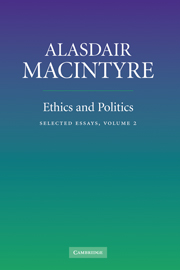Book contents
- Frontmatter
- Contents
- Preface
- Acknowledgments
- PART I LEARNING FROM ARISTOTLE AND AQUINAS
- PART II ETHICS
- PART III THE POLITICS OF ETHICS
- 8 Three perspectives on Marxism: 1953, 1968, 1995
- 9 Poetry as political philosophy: notes on Burke and Yeats
- 10 Some Enlightenment projects reconsidered
- 11 Social structures and their threats to moral agency
- 12 Toleration and the goods of conflict
- Index
9 - Poetry as political philosophy: notes on Burke and Yeats
Published online by Cambridge University Press: 27 January 2010
- Frontmatter
- Contents
- Preface
- Acknowledgments
- PART I LEARNING FROM ARISTOTLE AND AQUINAS
- PART II ETHICS
- PART III THE POLITICS OF ETHICS
- 8 Three perspectives on Marxism: 1953, 1968, 1995
- 9 Poetry as political philosophy: notes on Burke and Yeats
- 10 Some Enlightenment projects reconsidered
- 11 Social structures and their threats to moral agency
- 12 Toleration and the goods of conflict
- Index
Summary
To write about Yeats in a volume honoring Donald Davie is an act not of courage but of foolhardiness. For during the years in which he directed the Yeats School in Sligo, Donald Davie must have heard, let alone read, more words uttered about Yeats than any other human being has ever been subjected to. There can be almost no conceivable view to be taken about any poem of which Davie has not had to hear the case for and the case against elaborated at a length that would seem excessive anywhere but in Sligo. So to write about Yeats in partial disagreement with Davie, as I am about to do, is perhaps more than foolhardiness. Yet it has been part of Davie's magisterium as teacher and critic that he has often educated by inciting to disagreement. So that those who disagree with him are in their very disagreement indebted. As I shall be in writing about Yeats.
In the poetry that W. B. Yeats wrote in the decade between 1927 and 1937 one recurrent concern is the shedding of political illusions. Any life that embodies truth requires, so Yeats asserted in his poetry, a recognition that a coherent political imagination is no longer available. Yeats was himself concerned to make a particular poetic claim: that politics as understood by Edmund Burke could no longer achieve imagined and embodied reality in the Ireland of that period.
- Type
- Chapter
- Information
- Ethics and PoliticsSelected Essays, pp. 159 - 171Publisher: Cambridge University PressPrint publication year: 2006
- 2
- Cited by



